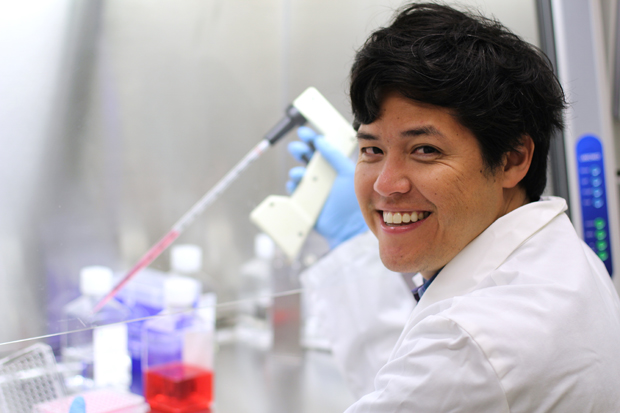In 1959, the Donald E. and Delia B. Baxter Foundation made its first grant of $6,000 to USC. Fifty-five years later, the foundation continues its tradition of supporting innovative medical research with $100,000 awards to two talented assistant professors: Justin Ichida, PhD, in the Department of Stem Cell Biology and Regenerative Medicine, and Kai Chen, PhD, in the Department of Radiology. The foundation also awarded $100,000 for the Baxter Medical Student Summer Research Fellowship Program.
Ichida will use his award to find new ways to treat patients with two fatal neurodegenerative disorders: frontotemporal dementia (FTD) and amyotrophic lateral sclerosis (ALS or Lou Gehrig’s disease).
The most common forms of both ALS and FTD are caused by the same genetic mutation in which six letters of the genetic code repeat as many as 1,000 times. In FTD, this causes the death of neurons in the front and sides of the brain, leading to a loss of personality, emotions, empathy, memory and, eventually, basic bodily functions. In ALS, the mutation causes the death of motor neurons — the cells that convey messages between the brain and the muscles — leading to paralysis and usually resulting in fatal respiratory failure.
Ichida’s lab is determining precisely how this genetic mutation causes these diseases, which will enable the discovery of more targeted drug therapies.
“The Baxter Foundation is looking to fund projects that are going to improve the lives of patients sooner rather than later,” said Ichida. “It’s a good fit for us. We don’t know the answer to the questions that we proposed, but we’re close to finding out.”
Chen’s award will improve the lives of a different group of patients by advancing a tumor imaging technology called “positron emission tomography,” or PET.
“This project leverages the interdisciplinary expertise of our group covering the fields of supramolecular chemistry, nanoparticles, radiochemistry, molecular imaging and cancer biology,” said Chen. “We envision that the success of our proposed research could change the current paradigm in PET cancer imaging, and open up new opportunities for pretargeted drug delivery.”
— Cristy Lytal


